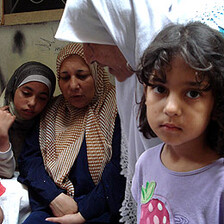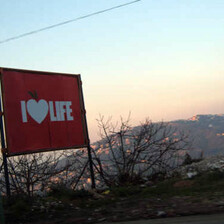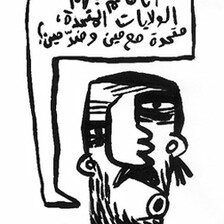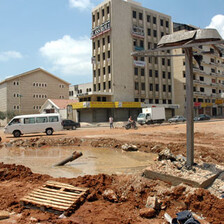Electronic Lebanon Shatila Camp, Beirut 24 July 2006
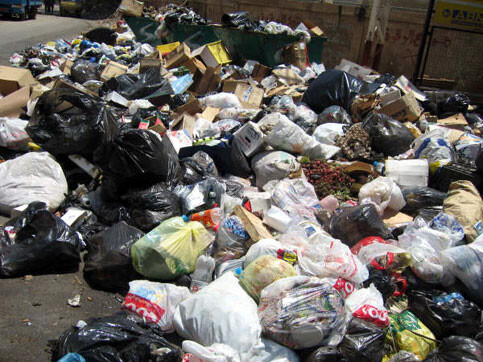
Trash piles up in the camp (Mayssoun Sukarieh)
Sabra … Sabra … Sabra …
I am sitting waiting for a cab to take me to Sabra, so I stroll down to Shatila to visit friends.
Many taxi cabs pass, but not one accepts to take me, until someone suggests he’ll take me to the other side and I get in from almost two streets away.
“It is not safe, daughter, didn’t you watch the news? They started hitting Palestinians.”
The taxi driver was referring to the five missiles that hit Rashidiyyeh Camp, in the suburbs of Tyre, and which left six injured, among them a four month old girl.
Though he made me pay three times the fare, the taxi driver still wanted to take passengers along.
“Salim Salam Bridge?” one prospective passenger asked.
“Get off my back! Bridge?! Am I crazy enough to go under a bridge? Wait for me till the war is over; I’ll take you to any bridge you want then!”
At the gates of the camps, heaps of garbage were the first thing to catch the eye. “Sukleen — the local waste managmennt company — is not collecting garbage anymore. Most of its workers are foreigners and they left,” a Shatila resident told me.
“Not that we were included in Sukleen activities before. As you know, daughter, we get nothing from the Lebanese government services. But at the outskirts of the camps, from the four sides, there are garbage containers for the neighbouring Lebanese areas that were part of Sukleen activities. They haven’t been collecting them for a four days now, and we are suffocating from the smell with every breath we take. What can we do daughter? We can do nothing … We can only wait …”
The camp is calm, and the TV screens which were put in the alleys at the beginning of the war have now been withdrawn to the confines of inner rooms. Fear has overtaken the giddiness they felt the first days of the war.
The fear is, of course, mixed with worries about the provision of daily needs:
“As you know, the camp residents are daily employees in the menial jobs we are allowed to hold in this country. Now, since everything has stopped, many of the residents haven’t been working for more than two weeks, and for people who live day-by-day, two weeks without work is starvation,” Ussama, a 19-year-old resident of Shatila, related.
“People are starting to sell what they have to get bread; yesterday two people came to ask me if I buy their cell phones, they are selling all what they have. Yesterday, a father of five children who used to work in delivery came to sell me his cell phone, since I work in that area of telephones. Well, it was worth at least 50,000 liras — $32 — and he offered it for just 30,000 liras — $20 — he that 30,000 liras will buy 30 bundles of bread and, which will allow them to live for a month. He asked me, ‘What do I need with the cell phone? I needed it for work, but where is work now?’” Usama concluded.
“Did you buy the phone from him?” I asked
Ussama just laughed. “Do you really think I have $20 to buy a phone?!”
Given the total absence of any UNRWA (United Nations Relief Works Agency) relief plan at the moment, Palestinian NGOs and some other volunteers in the camp are taking the responsibility of making a registry of those who have stayed in the camp, and an estimation of their needs.
“UNRWA made it clear that they have no budget for more than what they already give us; they will keep dealing with the hardship cases they already have — no more, no less.” Nuhad said.
“They give out some rotten rice and flour, and inedible vegetable oil, you know.”
Five organizations in the camp are now trying to take responsibility for aiding those families who stayed in the camp.
“But there is not much we can do, as you know,” Nuhad added. “Our capabilities are quite limited and now all the aid is going to the displaced in Lebanon, we even helped them, too, at the beginning; we were not aware it was going to be a long war, so we offered what we had.”
“At the beginning of the war, many displaced refugees came in to Shatila, such as Palestinian refugees who were living in the southern part of Beirut, or in South Lebanon, or even in the outskirts of the camp. They all fled to Shatila, thinking it would be a safer place. More than 15 families came to Shatila the second day of the war, and a few familes kept on coming, we started to give them food ratios. Two days ago, when the shelling was really hard on Dahiyeh [Beirut’s southern suburb], the camp started to shake. The buildings are not equipped and many windows were broken, so the people started to leave Shatila again.”
“The camp was a stop for few days, but most people left for the schools in the neighborhood, where we also are trying to assist,” anther social worker told me.
“People thought that Palestinians would not be targets until yesterday when they hit the Rashidiyyeh camp,” Rabie said. “Yaa Muhammad, most of the camp awoke and went down to one of the shelters in the camp where they stayed till the morning,” he added. The three shelters in the camp were cleaned by a volunteer group of youth in the camp during the first few days of the war.
“Although the Palestinians camps were not a target at the start of the war, we have got memories to draw on, and to be wary of ever trusting the Israelis. In 1982, they promised to keep the camp safe after the withdrawal of the PLO fighters, and you know what happened: in two nights they slaughtered more than 1,500 Shatila residents, so how can we ever trust them? We know that Israelis won’t miss any opportunity to kill Palestinians, and even if it is a declared war on Hizbullah, we were suspicious we would not be left alone, so we decided to ready the camp” Ussama added.
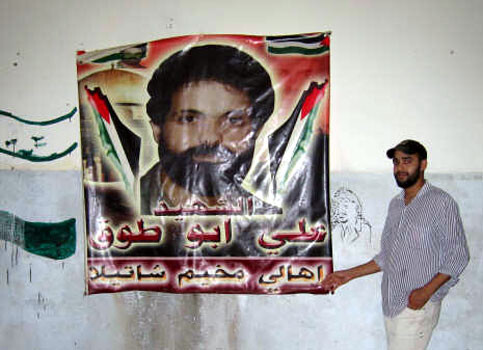
Ussama stands next to a poster honoring Ali Abou Toq (Mayssoun Sukarieh)
Many youth and women volunteered to clean the three shelters in the camps that were built during the mid-1980s “war of the camps.” One of the shelters is named for Ali Abou Toq, which Ussama took me to see. “It is the best one,” he said. Ali Abou Toq was one of the leaders of the “war of the camps” and was beloved by everybody in Shatila for his humanity. He was killed in the war, but he is still the talk of everyone who knew him. He was the one who started the shelter during the war of the camps, actually the shelters were sewage rooms that the Shatila residents, under his command, emptied, cleaned and stayed in during the siege of the camps.
“Many people slept in the shelter yesterday after we heard about the targeting of Rashidiyyeh,” Usama said on our way to the shelter. “I do not know, though, how they could have spent even the few hours of the morning in that shelter.” A few minutes after I stepped in, I started to cough. The camp smells of mold, humidity, dust and rottenness. But Ussama says, “We are used to that; you are coughing because you are not used to it, all the houses here are humid and dusty — but not to the extent that the shelter is, and not with rats and coakroaches,” he continued, laughing. “Watch out! Do not step on that coakroach!”
It was too dark for me to see, but Ussama had the candle, so he was aware of the roach roaming besides me.
Ussama and Rabieh accompanied me to the outskirt of the camp. After farewells and hugs, I noticed some mixture of worries in Rabieh’s eyes. He wondered whether we will see each other again. I promised we will, then I laughed and said, “If Israel wills, of course!”
It was easy to get a cab back to my neighborhood; it’s a relatively safe place at the moment. The taxi driver this time was from the southern part of Beirut. He lives now in a school in the neighborhood of Shatila. We talked a bit about the war, and his fears about his house, the only possession he has.
Minutes of silence followed our conversation, then a sudden forceful sentence burst from his lips: “Ah! I was wondering!”
“What is going on?” I asked.
“I was wondering why I can’t see clearly and why my vision is so blurred today. I just realized, I forgot to put on my eyeglasses”!”
I did not know how to react, whether to laugh or cry. We have all lost our minds the past few days.
Related Links
Mayssoun Sukarieh is a native of Beirut
